#ceasar augustus
Text
Tummy Ache
Nico: *gets a tummy ache and raises his hand*
Chiron: Yes, Mr. di Angelo?
Nico: I have a tummy ache, I'd like to see the doctor.
Octavian: A tummy ache?
Nico: Yes, OcTavian. I have a tummy and it aches, ergo, tummy ache
Octavian: Ergo?
Nico: It's latin, OcTavian.
#pjo#percy jackson#incorrect quotes#percy jackon and the olympians#pjo incorrect quotes#nico di angelo#solangelo#pjo octavian#ceasar augustus#chiron#chiron pjo#young sheldon#source: young sheldon
141 notes
·
View notes
Text






"My friend. My brother. Senator. General. Architect. Warrior. As long as this city stands on these hills, men will remember the name: Marcus Vipsanius Agrippa."
#domina tv#domina season 2#domina sky#domina mgm+#marcus vipsanius agrippa#ceasar augustus#augustus#agrippa#i shall miss you agrippa
189 notes
·
View notes
Text
Internet's wrapped in your finger vs internet's up in your ass 🙃
0 notes
Text

Nero as Antigone 🩸
#my art#dedicated to the three nero enthusiasts on tumblr you know who you are#this is an interpretation by the way‚ i don‘t know if he ever acted the particular play#emperor nero#lucius domitius ahenobarbus#nero claudius ceasar augustus germanicus#roman history#ancient greece#antigone#oh i will definitely draw antigone herself at some point#reference from adorkastock#ancient rome#sophocles
150 notes
·
View notes
Text
When the news spread that Julius Caesar’s adopted nephew Octavian had defeated Mark Antony at the battle of Actium (31 B.C.), thereby ensuring that he would become the emperor Augustus, at least one parrot appeared among his well-wishers, greeting him with the words “Hail Caesar, conqueror and leader!” (Macrobius 3.30; my translation). This was a calculated appeal to the victor’s largesse, of course; it takes a long time to teach a parrot to say anything, so the bird’s greeting offered powerful evidence of its owner’s loyalty.
In this case, the ploy worked, and Octavian bought the bird from its owner for a handsome sum. But another fortune-hunter used a raven for the same purpose, with less than ideal results:
It happened that a man appeared before Caesar with a raven, which he had taught to say, “Hail Caesar, conqueror and leader!”
Caesar, marveling, bought the dutiful bird for twenty thousand coins. But a companion of the bird’s trainer, who had received nothing of this generosity, declared that the trainer had another bird, too, which Caesar demanded to see as well. When brought forward, it greeted him with the words “Hail Antony, conqueror and leader!” (Macrobius 3.30; my translation)
The bird-trainer evidently had been hedging his bets.
from Parrot Culture: Our 2500-Year-Long Fascination with the World's Most Talkative Bird by Bruce Thomas Boehrer.
#parrots#ceasar#julias caesar#crows#Macrobius#octavian#augustus#ancient rome#I LOVE THIS BOOK SOOO MUCH you dont get it#tagammemnon
186 notes
·
View notes
Text



2 notes
·
View notes
Text
Novus stilus collectoris! Gratia pollentia Caesar!
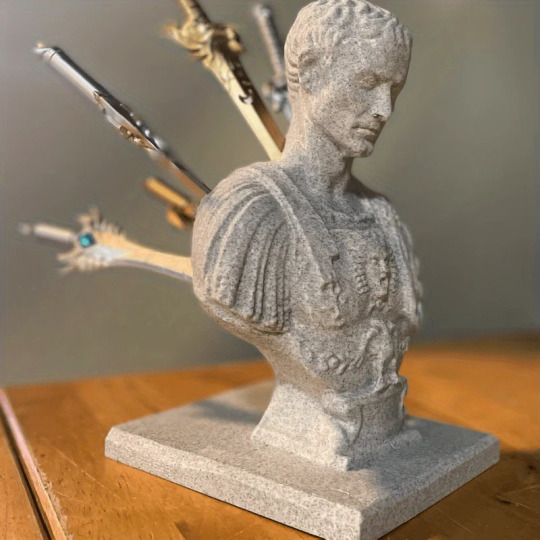
1 note
·
View note
Note
So, what now when Ceasar is dead?
Caesar 2: Augustus Boogaloo

696 notes
·
View notes
Text
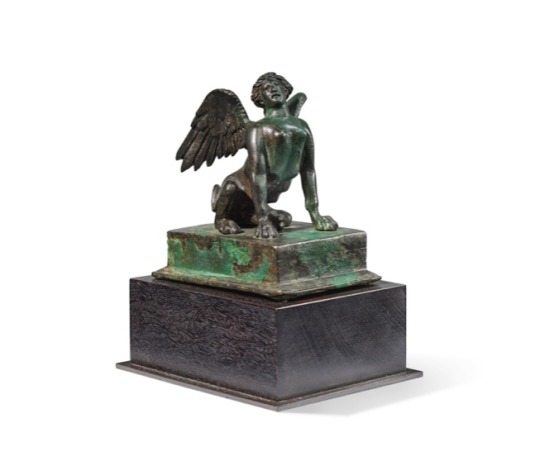
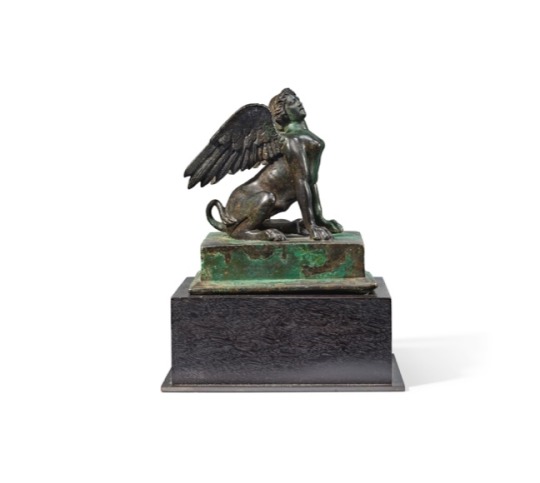
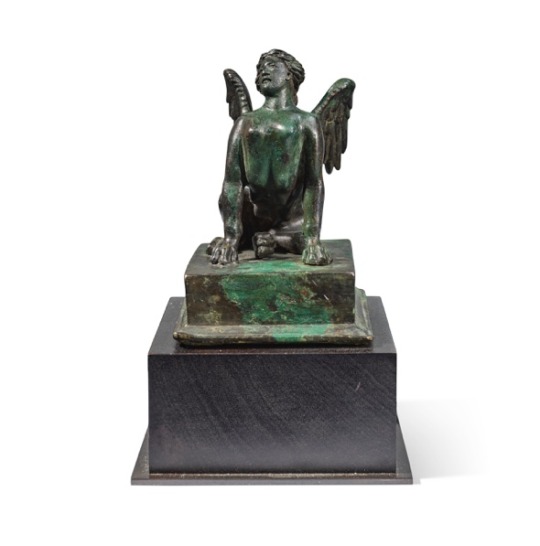
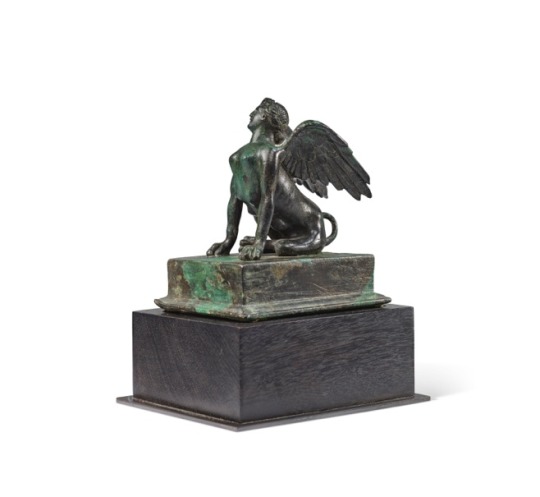

A ROMAN BRONZE SPHINX
CIRCA 1ST CENTURY B.C. - 1ST CENTURY A.D.
Representations of sphinxes are known in Egyptian, Greek and Roman art, from the Great Sphinx in Giza dating the 4th Dynasty to diminutive 3rd Century Roman intaglios: it was a popular subject matter. Originally the sphinx was an Egyptian invention - the term comes from the Egyptian shepesankh or 'living statue', combining a human head with the body of a lion. In Egyptian times they were seen as protectors of temples and sanctuaries or as an image of royalty with the face of the Pharaoh. This Roman bronze however, is a more sensuous winged representation, seated and pushing back on her front legs with her body raised and head thrown back, her breasts are visible and her ribcage beneath. The details of her hair and wings are finely incised.
The dating of this bronze sphinx suggests that she would have been made during the rule of Augustus, whose seal ring, that he had inherited from his adoptive father, Julius Ceasar, depicted a sphinx. Augustus also employed the device of a seated sphinx on some of his coins minted circa 20 B.C.
#A ROMAN BRONZE SPHINX#CIRCA 1ST CENTURY B.C. - 1ST CENTURY A.D.#bronze#bronze statue#bronze sculpture#ancient artifacts#archeology#archeolgst#history#history news#ancient history#ancient culture#ancient civilizations#ancient rome#roman history#roman empire#roman art
65 notes
·
View notes
Text
stupid NATM headcanon
you ever think about if the museum got an expansion on ancient Egypt or just like a temporary add-on? like what if there was a statue of Cleopatra because shes the best known queen? imagine her meeting everyone, funny yeah but imagine her meeting Octavius, Y'know the son of the guy for her biggest scandal?
cause i can imagine it would be pretty awkward, whats even more awkward is that you only have bit and pieces from your historical life so you know you are connected in some way, you just dunno what.
see also:
"so you are Gaius Octavius?"
"yes"
"as in the son of Julius Ceasar? Augustus Ceasar? Octavian?"
"well i dont go by that name here but yes"
"the man that got me murdered?"
"yes"
"ah"
or
*Cleo and Octavius stare at each other for a loooooong while*
everyone else: "are they okay? do we need to call larry?"
Cleo: "Ceasar?"
Octavius: *nods* "Ceasar"
#night at the museum#natm octavius#cleopatra#denial is a river in egypt#history nerd#dont mind me#ramblings
9 notes
·
View notes
Text
for fun, a break down of how Octavius' legion would be organized in 'Night at the Museum'
LEGION I MUSEA:
(Assuming that this is a Roman Empire legion in in the boonies, cut off from communication with Rome... which is a very real late roman experience. And like, the Romans had an understanding of museums and giants so...)
Praefectus Castrorum (Gaius Octavius)
In the movie he gives his title as "General" (which is obviously not a roman title.) I went with praefectus castrorum, because he strikes me as a centurion who worked his way up, and not so much a posh boy/politician. However, he does have an unusual amount amount of power for a praefectus castrorum, because *normally* he would be answering to a Legate or a senior military tribune, more of a senator type in contact with Rome. A since he's a magically animated figurine, he's just not doing that.
Also, it seems fanon to equate Gaius Octavius with Emperor Augustus Ceasar? Which is weird, because "Gaius Octavius" is just a decently common Roman name. Augustus' father, grandfather, and great-grandfather were also all called Gaius Octavius.
5 cohortes (infantry + artillery) (cohort = 80 men, lead by a centurion)
These are would also be the guys responsible for building the catapults (love to see it) and any other contraptions that might be needed. Roman cohorts were essentially armed construction crews.
You would think that a centurion should be in charge of 100 men, not 80, and they were, before the Marian reforms of 107-86 BC, which is pre Roman empire, and Octavius talks about the Roman empire a lot.
1 sagittariorum (archer unit) (80 men, lead by a centurion)
1 Medices (Medics) (10 men)
Quartermaster
Weapons instructor
Camp records-keeper
Standard Bearer
~ also, Octavius' sculpted nipple-cuirass is fine, and the way he's draping his cape is totally not.
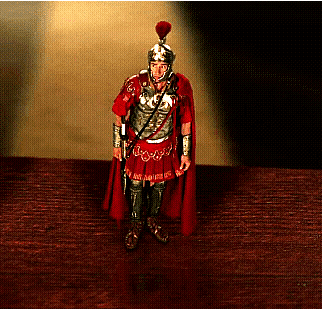
Why on earth are you wearing that like an elizabethan half-cape? Pin it to your shoulders, or pin both sides to one shoulder like a normal person.
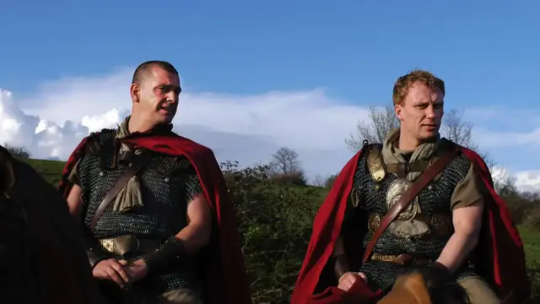
39 notes
·
View notes
Text

“Augustus Caesar, the first Roman Emperor under whom Rome went from being a republic to a mighty empire, was responsible for instituting "Pax Romana", an age of Roman dominance that ensured the unconditional submission of nations to Rome. When he desired that the whole empire should be registered, every person in every nation left what they were doing and went to their hometown to be registered, no matter how much the inconvenience. So Joseph and pregnant Mary headed out to Bethlehem where shortly Jesus would be born. Yet, seven hundred years before that, God had declared through the prophet Micah that the Messiah would be born in Bethlehem. So you see it was not the mighty Augustus Ceasar but it was God who was in ultimate control, bringing about the fulfilment of His promised word.” (“Just a Voice”)
“For just as rain and snow fall from heaven and do not return without watering the earth, making it bud and sprout, and providing seed to sow and food to eat, so My word that proceeds from My mouth will not return to Me empty, but it will accomplish what I please, and it will prosper where I send it. You will indeed go out with joy and be led forth in peace; the mountains and hills will burst into song before you, and all the trees of the field will clap their hands. Instead of the thornbush, a cypress will grow, and instead of the brier, a myrtle will spring up; they will make a name for the Lord, an everlasting sign, never to be destroyed.” Isaiah 55:10-13
9 notes
·
View notes
Text
using my gcse religious education qualification to tell you the hidden meanings behind mandela catalogue character names
Mark - A saint nicknamed “Mark the Evangelist” who wrote the Gospel of Mark
Cesar - The title of the Roman emperor which is mentioned several times throughout the Gospels; the reigning Ceasar during Jesus Christ’s adulthood was Tiberius Julius Caesar Augustus
Adam - The first man
Jonah - A prophet who, in the Book of Jonah, abandoned his duties of warning the city of Nineveh about its destruction and was punished by being eaten by a giant fish
Thatcher & Dave - Thatcher’s surname “Davis” and Dave’s forename are references to David, the third king of the United Kingdom of Israel, who slayed the monster Goliath in his youth, according to the Book of Samuel in the Hebrew Bible
Ruth - An Moabite woman who, according to the Book of Ruth in the Hebrew Bible, converts to Judaism and accepts the Israelite people as her own
Lynn - Possibly short for “Marilynn”, referencing either the Virgin Mary or Mary Magdalene
Jude - A shortened form of “Judas”, referencing Judas Iscariot, one of the original Twelve Apostles who is best known for betraying Jesus
Sarah - The first wife of Abraham, who is considered the first Hebrew and the founder of Judaism
Evelin - Reference to Eve, the first woman (or the second woman in Judaism)
#the mandela catalogue#mark heathcliff#cesar torres#adam murray#jonah marshall#thatcher davis#dave lee#ruth weaver#lynn murray#jude murray#sarah heathcliff#evelin miller
79 notes
·
View notes
Text

21|10|2022
Productive things I did today:
Practiced my thesis presentation
Finished reading Bunny by Mona Award
Practiced Irish on duoligo
Self care thing I did today:
Read first thing in the morning
Took the afternoon off
Took my anxiety meds instead of avoiding it just because, which is something I have done way too much lately and I need to stop
Tranquil's studying challenge // day 8
Teach others something about your area of study that they may not know about.
I'll take this opportunity to be annoying. This is mostly cause as someone who studies history I am very annoyed about basically everyone getting this wrong, so bare with me. Julius Caesar was not an emperor. His successor Augustus was, and here's the reason I am so annoyed everyone calls Caesar an emperor: he was litteraly murdered because people in the Senate thought he was acting too "king-like". A bit of backstory. The Roman Republic was built on the terror of the figure of the king, after the last king of Rome Tarquinius Superbus was taken down, the republic was built so that no single man could reach the same amount of power as the king used to have. To accuse someone in a position of power of behaving like a king was a great way to make everyone suspicious and have people turning against him. Ceasar was indeed starting to have a lot more power than it was normally allowed in Rome, and as I said he was litteraly murdered because of this reason, so no he was not an emperor. I won't annoy you more with how Augustus managed to get there just a few years after, but he was very smart about it.
📖: Bunny by Mona Awad
🎵: Animal by PVRIS
#studyblr#studyinspo#book#bookblr#notebook#journal#studying#notes#tranquilfallbuddies#myhoneststudyblr#journaling#desk#study space#mine#the---hermit
81 notes
·
View notes
Text
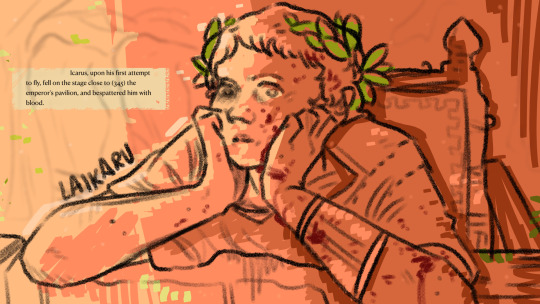
been in a nero mood lately since reading suetonius’ twelve ceasars on the plane.
#my art#ancient rome#emperor nero#classics#classical studies#lucius domitius ahenobarbus#nero claudius ceasar augustus germanicus#icarus#i know his greek obsession too well#suetonius#the twelve ceasars#book
33 notes
·
View notes
Text
So, I am studying archeology and of course we lern a lot about Roman emporers. But the thing is, we learn about their coins, their statues and their success (or failure) but we learn nothing about them as personalities.
I wanna know what Ceasars hobbies were, what was Augustus favourite month (i bet it was August), what was Hadrians favorite food ?. What were some small things that brought emperor XY joy ? Did the senators and the emperors gossip about each other?
Basically I wanna know the gossip of Ancient Rome and how all these famous people were in privat
2 notes
·
View notes